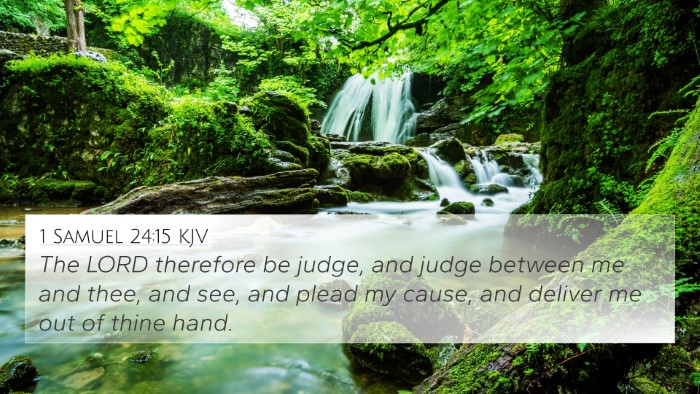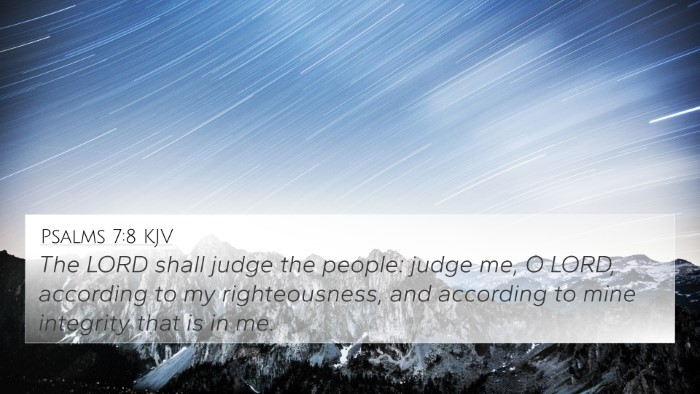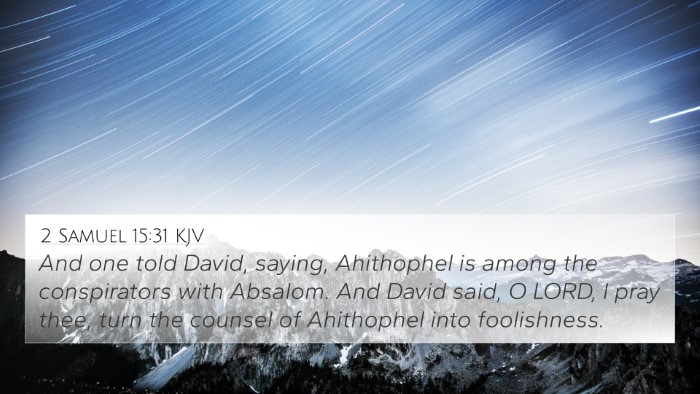Understanding Psalms 43:1
Bible Verse: Psalms 43:1 - "Judge me, O God, and plead my cause against an ungodly nation: O deliver me from the deceitful and unjust man."
This verse lays a heartfelt plea to God for justice and divine intervention. The psalmist finds himself in a position of distress, appealing to the Lord as a righteous judge who understands the struggles faced against unrighteousness and deceit.
Summary of Insights
The verse encapsulates several key themes prevalent in the Psalms, reflecting human vulnerability and the need for divine guidance. The psalmist identifies himself in a struggle against an "ungodly nation" while yearning for the Lord's deliverance from "deceitful and unjust" individuals. This prayer can be understood in both a literal and spiritual sense as a quest for justice amid adversity.
Thematic Connections and Cross-References
In Psalms 43:1, we see significant themes that resonate throughout the scriptures, highlighting the need for divine justice and deliverance. Here are several Bible verses that relate to this theme:
- Psalms 7:8: "The LORD shall judge the people: judge me, O LORD, according to my righteousness, and according to mine integrity that is in me."
- Psalms 26:1: "Judge me, O LORD; for I have walked in mine integrity: I have trusted also in the LORD; therefore I shall not slide."
- Psalms 41:1: "Blessed is he that considereth the poor: the LORD will deliver him in time of trouble."
- Isaiah 33:22: "For the LORD is our judge, the LORD is our lawgiver, the LORD is our king; he will save us."
- Romans 12:19: "Dearly beloved, avenge not yourselves, but rather give place unto wrath: for it is written, Vengeance is mine; I will repay, saith the Lord."
- Proverbs 21:15: "It is joy to the just to do judgment: but destruction shall be to the workers of iniquity."
- Psalms 34:17: "The righteous cry, and the LORD heareth, and delivereth them out of all their troubles."
Interpretation and Analysis
The psalmist's request for God to "judge" indicates a strong belief in the justice of God as a core aspect of His character. The appeal to God reflects a personal connection, highlighting how believers can bring their grievances before the Almighty.
Matthew Henry comments that the phrase "plead my cause" indicates that the psalmist feels powerless against the unrighteousness surrounding him. He seeks both advocacy and rescue from God. This reflects a common theme in the Psalms where the believer looks to God as a source of hope in dire circumstances.
Albert Barnes adds that the description of the "ungodly nation" as well as "deceitful and unjust man" can be understood as a representation of any adverse force that opposes the believer's faith journey. It signifies the spiritual battles that challenge followers of God throughout their lives.
Adam Clarke elaborates on the character of God as the divine judge. The psalmist embodies a vulnerable humanity calling upon the truth of God's righteousness, emphasizing the dependency of believers on divine justice to prevail over their foes. This plea mirrors the struggles faced by many believers who endure injustice and unfair treatment.
Practical Applications
Those studying this verse can draw several practical applications for their lives today:
- Holding onto Faith: In moments of unfairness or distress, believers can learn from the psalmist's example to seek God's intervention and maintain their faith in His righteousness.
- Seeking Justice: Like the psalmist, followers of Christ are encouraged to advocate for justice and truth in their communities and to pray for deliverance from deception.
- Understanding Divine Justice: Reflecting on the nature of God as a judge, believers can cultivate a deeper understanding of justice and righteousness, ensuring that their hearts align with these attributes.
- Engaging in Intercessory Prayer: The psalmist teaches the value of intercessory prayer, prompting believers to advocate for others facing similar injustices.
Concluding Thoughts
Psalms 43:1 serves as a profound reminder of the believer's position in the face of adversity and despair. The cry for God’s judgment and deliverance encourages the faithful to remain steadfast. By examining this verse in conjunction with others, readers can gain a comprehensive understanding of biblical justice and divine advocacy.
Through thematic Bible verse connections, one can appreciate the inter-Biblical dialogue that enriches the understanding of God's character and His call for justice throughout scripture.

















